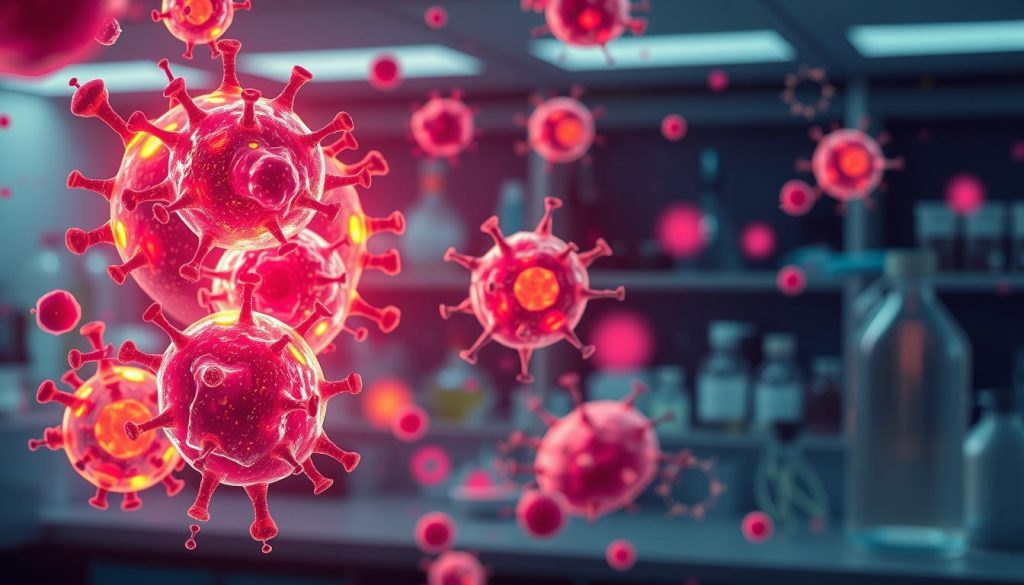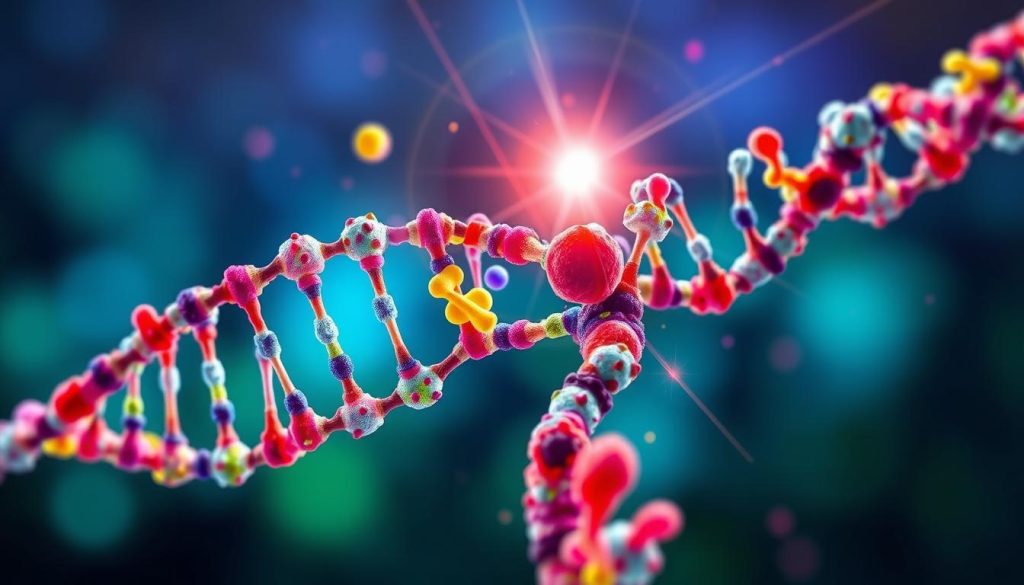Immunotherapy is a new hope in fighting cancer. It uses the body’s defense to strengthen the immune system. This innovative cancer therapy aims to outsmart cancer, one of humanity’s biggest foes.
This approach is more than just a treatment. It’s a science that changes how we fight cancer. It’s about understanding and using the immune system’s power.
Immunotherapy targets cancer cells in a way that’s unique to each patient. This guide will show you how immunotherapy works, its history, and its potential to change cancer treatment.
Key Takeaways
- Immunotherapy is a new direction in cancer treatment.
- It teaches the immune system to fight cancer.
- It offers hope for more effective cancer treatments.
- It has unique benefits and challenges.
- Understanding immunotherapy is key to its promise in oncology.
- The overview shows the importance of immunotherapy in cancer treatment.
Exploring the Basics of Cancer Immunotherapy
Immunotherapy is a new way to fight cancer. It uses the body’s immune system to attack cancer. This method helps the immune system fight cancer better.
Immunotherapy Definition
Immunotherapy boosts the body’s natural defenses against cancer. It uses substances to improve the immune system. This includes monoclonal antibodies and vaccines that target cancer cells.
The Human Immune System’s Role in Cancer
The immune system fights cancer cells but sometimes fails. Knowing how it works is key to fighting cancer. Immunotherapy aims to improve the immune system’s attack on cancer.
Immunotherapy gives hope to those with hard-to-treat cancers. It’s a major step in improving cancer treatment.
What is Immunotherapy for Cancer
Immunotherapy for cancer is a new way to fight cancer. It’s different from old treatments like chemotherapy and radiation. This method uses the body’s immune system to find and kill cancer cells.
Unlike old treatments, immunotherapy only targets cancer cells. This means it doesn’t harm healthy cells as much. It’s a smarter way to treat cancer.
Immunotherapy works by using the body’s own defenses against cancer. It gives the immune system tools to fight cancer better. This makes treatment more personal and effective for many cancers.

This approach keeps the immune system strong over time. It helps manage cancer and prevent it from coming back. Immunotherapy is always getting better, with new ways to fight cancer being found.
Immunotherapy is changing cancer care. It offers patients new, effective treatments that were once impossible.
Immunotherapy is different because it’s more precise and has fewer side effects. As research goes on, it might help more people with cancer. This could make cancer care even better.
Different Types of Cancer Immunotherapy
Recent advances in personalized medicine have led to new immunotherapy types. These therapies aim to boost the body’s immune system to fight cancer better.
Checkpoint Inhibitors
Checkpoint inhibitors are key in fighting advanced cancer. They target immune checkpoints that cancer cells use to hide from the immune system. By blocking these checkpoints, like PD-1/PD-L1 and CTLA-4, these inhibitors help T-cells attack cancer cells more effectively. This therapy has shown great promise in treating skin, lung, and kidney cancers.
CAR T-cell Therapy
CAR T-cell therapy is a prime example of personalized medicine. It changes a patient’s T-cells to better find and destroy cancer cells. This is done by adding chimeric antigen receptors (CARs) to the T-cells. It’s mainly used for blood cancers like leukemia and lymphoma.
Cancer Vaccines
Cancer vaccines are a special kind of immunotherapy. They aim to stop cancer from growing or treat it by boosting the body’s defenses. Therapeutic cancer vaccines, for instance, trigger an immune response against cancer cells by showing them specific antigens. The prostate cancer vaccine Sipuleucel-T is a success story in this field.
These immunotherapy types show the future of cancer treatment. They mark a move towards more targeted, effective, and personalized treatments. Their development and use offer hope for better patient outcomes in the fight against cancer.
The Evolution of Immunotherapy in Oncology
The story of immunotherapy in oncology is one of hard work and immunological research. It started as a small part of cancer treatment but has become key in evolution of cancer care.
Looking at the major steps shows how immunotherapy grew from a new idea to a main treatment for many cancers. This growth shows the power of science and a big change in how we treat cancer.

- Inception of Monoclonal Antibodies: This technology was a big change, giving treatments that help the body fight cancer better.
- Adoption of CAR T-cell Therapy: CAR T-cell treatments were a big step forward, changing how we treat some blood cancers.
- Advances in Checkpoint Inhibitors: Checkpoint inhibitors have greatly improved survival rates in cancers like melanoma and lung cancer.
| Year | Breakthrough | Impact |
|---|---|---|
| 1997 | Approval of the first Monoclonal Antibody, Rituximab | Introduced a new era in targeted cancer therapy |
| 2011 | FDA approves Ipilimumab, the first CTLA-4 inhibitor | Enabled a new approach in melanoma treatment |
| 2017 | Approval of the first CAR T-cell therapy | Offered new hope for patients with advanced leukemias |
These milestones show how fast and important immunotherapy is. They also show how immunological research and cancer treatment breakthroughs go hand in hand. This connection keeps improving cancer care, bringing us closer to better treatments.
How Immunotherapy Works Against Cancer
The mechanism of action of immunotherapy in cancer treatment is fascinating. It shows how medical science uses the body’s defenses to fight disease. By boosting the immune system’s power to find and kill cancer cells, these therapies offer hope for better treatments.
Boosting the Immune Response
Immunotherapy’s main goal is immune modulation. This means making the immune system better at spotting and fighting cancer cells. It works by improving or changing immune cells like dendritic cells and T-cells to attack cancer more effectively.
Targeting Specific Cancer Cells
The key to cancer cell targeting is being precise. This helps avoid harming healthy cells while focusing on cancer cells. For example, CAR T-cell therapy trains immune cells to find and kill cancer cells with specific markers, showing the therapy’s accuracy.
| Therapy Type | Target | Benefit |
|---|---|---|
| CAR T-cell Therapy | Cancer-specific antigens | High precision in cancer cell targeting |
| Checkpoint Inhibitors | Immune checkpoints | Releases the ‘brakes’ on immune cells |
| Vaccines like the Pink Eraser | Multiple targets | Prevents recurrence |
Selecting Candidates for Immunotherapy
Choosing the right patients for immunotherapy is key to better cancer treatment results. It’s important to pick those most likely to benefit from these advanced treatments. This way, treatments work better and side effects are less for those who won’t get better.
Immunotherapy eligibility comes from genetic tests, tumor profiles, and checking the patient’s health and immune system. These steps help doctors create tailored cancer treatment plans that fit each patient’s needs.
- Genetic markers that predict responsiveness to immunotherapy
- Evaluation of tumor microenvironment characteristics
- Assessment of patient’s immune health baseline
This detailed method to patient selection shows how important personalized medicine is in today’s cancer care. It makes sure immunotherapy eligibility matches each patient’s unique situation.

| Factor | Role in Immunotherapy Selection |
|---|---|
| Genetic Markers | Identify patients with genetic predispositions responsive to immunotherapy |
| Tumor Properties | Analysis of tumor antigens and microenvironment suitability for immunotherapy |
| Patient’s Immune Status | Evaluation of immune system capability and potential for enhancement via immunotherapy |
The aim of these detailed checks is to create a tailored cancer treatment plan. This ensures the best results for patients getting immunotherapy. By using this method, cancer doctors can offer care that is as precise and effective as it can be.
Immunotherapy Treatment Protocols
Immunotherapy is changing how we fight cancer, offering new hope. It uses immunotherapy treatment protocols that are more personal and advanced. These protocols focus on combination therapy and treatments that fit each patient’s cancer.
Combining Immunotherapy with Other Treatments
Using immunotherapy with other treatments is key in strategic cancer care. This mix includes immunotherapy, chemotherapy, surgery, and radiation. It uses each treatment’s strengths to help patients more.
Personalized Immunotherapy Approaches
Immunotherapy is getting more personal. It’s based on the idea that each cancer is unique. Doctors use genetic info and cancer profiles to create treatments that really work for each patient.
| Treatment Type | Typical Applications | Benefits |
|---|---|---|
| Monotherapy | Early stage cancers | Focuses on immune system enhancement |
| Combination Therapy | Advanced or resistant cancers | Targets multiple cancer pathways, reduces resistance |
| Personalized Immunotherapy | Genetically unique cancers | Tailored to patient’s genetic makeup, potentially more effective |
These new treatment protocols are improving results and paving the way for more cancer therapy breakthroughs. They follow the principles of strategic cancer care closely.
Immunotherapy for Lung Cancer: A Closer Look
Exploring immunotherapy for lung cancer reveals important progress. This treatment has opened new doors for patients. It has also improved survival rates and quality of life.
Researchers and doctors have made big strides. Their work has led to significant treatment advances. This makes it worth discussing in detail.
Recent Advances in Lung Cancer Immunotherapy
New discoveries are changing lung cancer treatment. Next-generation sequencing and biomarker identification help make treatments more precise. This is thanks to understanding the genetic makeup of tumors.
Checkpoint inhibitors have been a game-changer. They help the immune system attack cancer cells. This has been a major breakthrough.
“Immunotherapy is reshaping the landscape of lung cancer treatment, offering hope where there was previously resignation.” – Leading oncologist
Success Stories and Clinical Outcomes
The impact of immunotherapy for lung cancer is clear in many patient success stories. These stories show the scientific wins and personal victories. They inspire and prove the treatment’s effectiveness.
| Year | Patient Survival Rate Increase (%) | Reported Quality of Life Improvement |
|---|---|---|
| 2018 | 25 | Significant |
| 2020 | 30 | High |
| 2023 | 35 | Very High |
These numbers show the real benefits of immunotherapy. They highlight the treatment’s success and the positive impact on patients. This supports further research and use in lung cancer treatment.
Immunotherapy for Breast Cancer: Innovations and Results
The treatment of breast cancer has seen a big change with immunotherapy for breast cancer. This therapy boosts the immune system’s fight against cancer. It has led to better results for many patients.
New treatments focus on using the immune system to target breast cancer cells. These treatments help manage the disease better. This leads to longer survival times and better quality of life for patients.
Monoclonal antibodies and immune checkpoint inhibitors are key in immunotherapy for breast cancer. They have been crucial in treating tough-to-manage breast cancers.
| Therapy Type | Description | Impact |
|---|---|---|
| Monoclonal Antibodies | Proteins that can bind to cancer cells and help the immune system recognize and destroy them. | Improved targeting of cancer cells, reducing side effects. |
| Checkpoint Inhibitors | Drugs that help the immune system recognize and attack cancer cells more effectively. | Has shown to improve survival rates in aggressive cases. |
The use of these innovative therapies has improved treatment outcomes. It also paves the way for personalized medicine. Treatments are now tailored to each patient’s genetic makeup and tumor profile. This makes treatments more effective and reduces side effects.
Clinical trials and ongoing research are looking into new innovative therapies for immunotherapy for breast cancer. They promise even better results in the future. This progress not only improves treatment options but also gives hope to thousands of patients and their families.
Measuring the Effectiveness of Immunotherapy
Finding out how well immunotherapy works is key. It needs strong clinical measuring and a focus on patient wellbeing. As tech and medical knowledge grow, so do the ways we check if treatments are working.
Clinical Markers and Indicators
Doctors use many clinical markers to see if immunotherapy is working. They look at things like how big tumors are and how the body’s cells react. Each piece of data helps paint a full picture of how well the treatment is doing.
| Marker | Description | Relevance to Immunotherapy |
|---|---|---|
| Tumor Size | Measurement of tumor dimensions via imaging | Indicates physical response to treatment |
| Immune Cell Count | Assessment of immune cells in the bloodstream | Reflects the body’s immune activation |
| Biomarkers | Proteins or molecules indicating biological states | Helps predict and monitor therapy response |
Patient Quality of Life and Immunotherapy
Patient wellbeing is just as important as clinical results when it comes to immunotherapy effectiveness. Things like less pain, better movement, and improved mood are just as important as shrinking tumors.

In short, the real value of immunotherapy is seen in how it improves patients’ lives. How patients feel, move, and live is crucial. These aspects are key to understanding if immunotherapy is truly successful, making detailed checks essential in the battle against cancer.
Potential Side Effects of Immunotherapy
Immunotherapy is a big step forward in cancer treatment. But, it’s important to know about its possible side effects. This helps keep patients safe and improves their treatment results. We’ll look at common immunotherapy side effects and how to manage them.
Common Immunotherapy Side Effects
People getting immunotherapy might feel tired, have skin issues, or flu-like symptoms. These problems happen because the immune system is fighting cancer too hard. It can also hurt healthy tissues. Serious side effects include autoimmune reactions.
Management Strategies for Adverse Reactions
To keep patients safe during immunotherapy, we need to act early and carefully. Here are some ways to reduce discomfort and risks:
- Monitoring: Keeping a close eye on patients helps catch side effects early.
- Medication: Giving medicines to ease pain, inflammation, or severe immune reactions.
- Education: Teaching patients about possible side effects and when to get help.
- Adjustment of therapy: Changing dosages or schedules to manage side effects without losing treatment effectiveness.
Using these strategies well needs teamwork. Doctors, nurses, and caregivers must work together. Their goal is to keep the patient’s quality of life high.
Current Clinical Trials in Immunotherapy
The search for better cancer treatments never stops, with immunotherapy clinical trials leading the way. These trials are more than just tests; they are the light at the end of the tunnel for innovative research and future cancer therapies. Researchers are working hard to find new ways to use immune therapies, which could change how we treat cancer worldwide.
Exploring Groundbreaking Clinical Trials
These trials aim to create treatments that are more effective and easier to use. They target many types of cancer with great precision. For example, scientists are looking into modifying T-cells to fight cancer better, and early results are encouraging.
These trials give us a peek into the future of cancer treatment. They show us how we might see major breakthroughs in fighting cancer.
The Future of Immunotherapy Through Clinical Research
The effects of immunotherapy clinical trials will be huge. They aim to not only increase survival rates but also improve life quality for cancer patients. With each trial, we learn more, leading to even more innovative research and future cancer therapies. These could one day make cancer a manageable disease.

Cost and Accessibility of Immunotherapy
The cost of treatment, insurance coverage, and healthcare accessibility are key factors for immunotherapy in cancer patients. This treatment is advanced but comes with financial hurdles and chances for healthcare systems.
The cost of treatment changes a lot depending on the immunotherapy type and how long it’s needed. Insurance is crucial in covering these costs. But, not all patients have the same access to these treatments.
| Treatment Type | Average Cost | Insurance Coverage Availability |
|---|---|---|
| Checkpoint Inhibitors | $150,000/year | Widely Covered |
| CAR T-cell Therapy | $375,000/treatment | Limited Coverage |
| Cancer Vaccines | $100,000 – $200,000/treatment | Varies Significantly |
To make healthcare accessibility better, we need more insurance coverage and help for low-income patients. It’s important for healthcare providers, insurance companies, and lawmakers to talk more. This way, we can make sure more people can get these life-saving treatments.
Immunotherapy Drugs: An Overview
Oncology has seen rapid growth, making immunotherapy drugs a key player in fighting cancer. These treatments are now a big part of cancer medicine, showing big steps forward in drug making.
Key Drugs Used in Cancer Immunotherapy
Many important drugs are in the immunotherapy field. They work by targeting the immune system to fight cancer. PD-1 inhibitors, CTLA-4 inhibitors, and CAR T-cell therapies are leading the way in cancer treatment.
The Development of New Immunotherapeutic Medications
Research in cancer medicines is always moving forward. It aims to make treatments better and safer. This involves many clinical trials to check if the drugs work well before they are available.
Today, immunotherapy drugs offer new hope for patients. They also challenge scientists to keep pushing the limits of what we know about cancer.
| Drug Type | Mechanism | Usage |
|---|---|---|
| PD-1 Inhibitors | Blocks PD-1 protein on T cells to enhance immune response | Used primarily in melanomas, non-small cell lung cancer |
| CTLA-4 Inhibitors | Attenuates CTLA-4 mediated downregulation of immune response | Used in melanomas and renal cancer |
| CAR T-cell Therapy | Engineers patient’s T-cells to attack cancer cells | Employed in certain types of leukemia and lymphomas |
Immunotherapy drugs are opening up new possibilities in cancer treatment. They promise treatments that fit each person’s unique needs. This shows the dedication to finding better ways to fight cancer.
The Social Impact of Immunotherapy
Immunotherapy has changed cancer treatment and how people, communities, and healthcare systems work together. The social impact of this treatment goes beyond just treating cancer. It helps with advocacy and builds community support networks that are key for patient care.
Patient Advocacy and Immunotherapy Awareness
More people are learning about immunotherapy, thanks to awareness efforts. This has led to more patient advocacy. Groups are working hard to teach the public and lawmakers about immunotherapy’s benefits and challenges. They aim to make sure everyone can get this treatment.
- Enhancing public knowledge and demystifying immunotherapy
- Rallying for broader insurance frameworks to support innovative treatments
- Organizing community events to promote funding and research
The Role of Community Support in Treatment
Community support is vital for those going through immunotherapy. Local and online groups offer help and encouragement. They help patients and their families deal with the challenges of cancer treatment.
Community networks are not only a cornerstone of emotional backing but also a bridge to various logistical and financial resources essential for many undergoing prolonged treatment.
| Aspect | Influence of Community Support |
|---|---|
| Emotional Strength | Provides emotional stability and reduces treatment-related anxiety and stress. |
| Resource Sharing | Facilitates access to transportation, meal services, and caregiving, critical for patients who are frequently incapacitated post-treatment. |
| Advocacy and Awareness | Boosts efforts in raising awareness and funding, influencing policy changes that benefit the patient community. |
Conclusion
Immunotherapy has changed cancer treatment forever. It’s a big step forward in fighting cancer. This therapy uses the body’s immune system to attack cancer cells.
It’s all about empowering the immune system. This makes treatments more personal and effective for each patient. It’s a big change in how doctors treat cancer today.
Research keeps improving immunotherapy. This brings hope to the future of cancer treatment. But, there are still challenges ahead.
These include making treatments safer and more accessible. Immunotherapy is key to improving cancer care. It’s a new way to fight cancer, not just treat it.
Immunotherapy is very promising. It shows the future of cancer treatment is bright. With each success, we get closer to beating cancer.
Science keeps pushing us forward. It shows the power of human spirit and medical genius. Immunotherapy is leading the way in the fight against cancer.
FAQ
Q: What is immunotherapy for cancer?
A: Immunotherapy uses the body’s immune system to fight cancer. It includes treatments that boost the immune system’s cancer-fighting abilities.
Q: How does the immune system function in cancer defense?
A: The immune system finds and kills abnormal cells, like cancer cells. But, cancer cells can hide from the immune system. Immunotherapy helps the immune system fight cancer better.
Q: What are the different types of cancer immunotherapy?
A: There are several types of immunotherapy. Checkpoint inhibitors remove brakes on the immune system. CAR T-cell therapy modifies T-cells to attack cancer. Cancer vaccines help the immune system recognize and target cancer cells.
Q: Can immunotherapy work for all kinds of cancers?
A: Immunotherapy is approved for many cancers, like lung, breast, and skin cancer. But, it works differently for each person and cancer type.
Q: What are the common side effects of immunotherapy?
A: Side effects can include fatigue, skin reactions, fever, and muscle pain. Serious side effects can involve the immune system attacking healthy tissues.
Q: Is immunotherapy a better option than chemotherapy or radiation?
A: Immunotherapy might be better for some patients, especially when used with other treatments. It targets specific cells and can have fewer side effects. The best treatment depends on the cancer and patient’s health.
Q: How successful is immunotherapy for lung cancer?
A: Immunotherapy has greatly improved lung cancer treatment for many. It can significantly increase survival rates. Success depends on the cancer’s genetic markers and stage.
Q: Are there immunotherapy options for breast cancer?
A: Yes, there are immunotherapy drugs for breast cancer, especially for those with specific markers. They are also being tested with chemotherapy.
Q: How are patients selected for immunotherapy?
A: Patients are chosen based on their cancer’s genetic profile and markers. Their health and past treatments are also considered. Tests like biopsies and genetic sequencing help decide if they’re eligible.
Q: Are there clinical trials for new immunotherapies?
A: Yes, many clinical trials are testing new immunotherapies. These trials are key to finding better treatments and helping more cancer types.
Q: What are the costs associated with immunotherapy?
A: Immunotherapy can be expensive, depending on the treatment and how long it lasts. Some patients have insurance, while others need financial help or drug programs.
Q: How do immunotherapy drugs work?
A: Immunotherapy drugs work in different ways. Some block immune brakes that cancer cells use. Others train immune cells to fight cancer or boost the immune response.
Q: Why is community support important in the treatment with immunotherapy?
A: Community support is crucial for patients. It offers emotional support, educational resources, and sometimes financial help. It helps patients deal with treatment challenges and improves their quality of life.


















